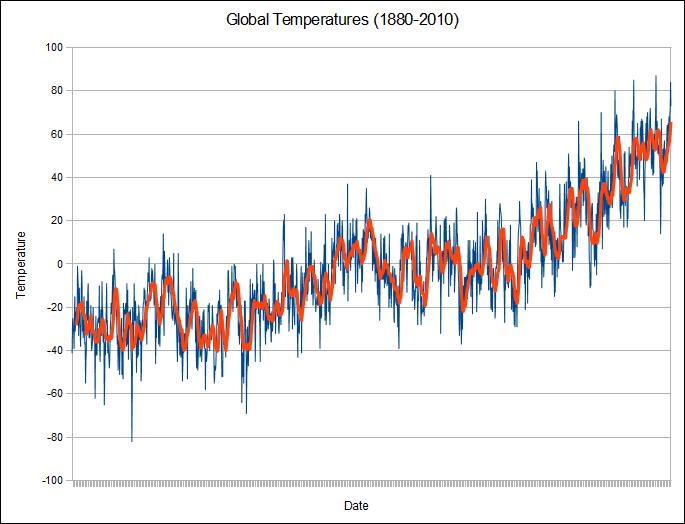So much for all the hullabaloo we've been hearing about 'global cooling' in the media and on these forums. So much too for the 'there has been no global warming' meme. These claims were all based on the ever-scholarly journalism of the finest British tabloids. So long to that nonsense.
Here's the news for the day. The past 12-months have been the warmest such period in the temperature record, according to data from the Goddard Institute of Space Studies. Check it out for yourself; I've included on this graph the monthly figures and a 12-month running average. I should note that the data used for this extends all the way back to 1880; the strong warming that caused scientists to take note began in earnest about half a century ago.

I don't think it's hard to see a trend becoming apparent in the past half century. There's a lot of noise, even in the 12-month figures. You can distinctly see the 1998 El Nino event pushing the actual figure well above the trend, just as you can see the 1991 eruption of Pinatubo driving the actual temperatures below what you would expect. I could throw in 5-year or 12-year smoothing and it would take a lot of those short-term influences out, but I don't feel any real need to. The direction we're heading is quite evident in the data.
It's very important to understand that our climate is understood to dampen changes early on. The oceans can absorb tremendous amounts of heat (cooling the atmosphere) literally for centuries before they've come to equilibrium with the new 'normal'. Our climate is also understood to react strongly to changes. Retreating ice-packs lead to darker land exposed to the sun which causes the ground to absorb more heat (less is reflected back into space than it would be were it covered with ice and snow). The thawing of polar regions causes carbon that was once buried in the permafrost to interact with the atmosphere again. The vast methane hydrate deposits in the Arctic Ocean are already releasing much more methane that scientists had thought they were just a few years ago. Methane is a potent greenhouse gas, and if we screw up badly enough to set those triggers off we'll have a global warming situation that is outside of human control.
I don't care that much about polar bears or penguins. Given that nothing else matters, I'd like to make sure humans don't push those species to extinction, but other things do matter. Making sure people have jobs matters. The ability for people to put food on their family's table matters. That's what I'm concerned about. Being as I just brought up methane release from hydrate deposits in the Arctic, let's touch on that briefly. Scientists suspect that large methane releases in the past have caused the ocean to become anoxic, leading to mass extinctions in the very waters that a friend of mine makes a living fishing.
More obvious concerns are the flooding of low-lying regions around the world. More of a few of those areas are currently being used as farmland for their excellent soil, and most major cities in the world are situated in low-lying regions that may be subject to coastal flooding within the next century (let alone the next few). While changes in rainfall could produces mega-droughts and cause massive crop failure in the great state of California, the very same global warming could cause excessive rainfall in the great river valleys of China, displacing millions of farmers trying to feed their families when record-breaking floods swamp their land and homes. What's worse, climate change is pushing crop growth towards unsuitable polar lands:
We owe it to our ancestors who did their best to give us a better world and our children who deserve as much, to deal with this problem now.
Here's the news for the day. The past 12-months have been the warmest such period in the temperature record, according to data from the Goddard Institute of Space Studies. Check it out for yourself; I've included on this graph the monthly figures and a 12-month running average. I should note that the data used for this extends all the way back to 1880; the strong warming that caused scientists to take note began in earnest about half a century ago.
I don't think it's hard to see a trend becoming apparent in the past half century. There's a lot of noise, even in the 12-month figures. You can distinctly see the 1998 El Nino event pushing the actual figure well above the trend, just as you can see the 1991 eruption of Pinatubo driving the actual temperatures below what you would expect. I could throw in 5-year or 12-year smoothing and it would take a lot of those short-term influences out, but I don't feel any real need to. The direction we're heading is quite evident in the data.
It's very important to understand that our climate is understood to dampen changes early on. The oceans can absorb tremendous amounts of heat (cooling the atmosphere) literally for centuries before they've come to equilibrium with the new 'normal'. Our climate is also understood to react strongly to changes. Retreating ice-packs lead to darker land exposed to the sun which causes the ground to absorb more heat (less is reflected back into space than it would be were it covered with ice and snow). The thawing of polar regions causes carbon that was once buried in the permafrost to interact with the atmosphere again. The vast methane hydrate deposits in the Arctic Ocean are already releasing much more methane that scientists had thought they were just a few years ago. Methane is a potent greenhouse gas, and if we screw up badly enough to set those triggers off we'll have a global warming situation that is outside of human control.
I don't care that much about polar bears or penguins. Given that nothing else matters, I'd like to make sure humans don't push those species to extinction, but other things do matter. Making sure people have jobs matters. The ability for people to put food on their family's table matters. That's what I'm concerned about. Being as I just brought up methane release from hydrate deposits in the Arctic, let's touch on that briefly. Scientists suspect that large methane releases in the past have caused the ocean to become anoxic, leading to mass extinctions in the very waters that a friend of mine makes a living fishing.
More obvious concerns are the flooding of low-lying regions around the world. More of a few of those areas are currently being used as farmland for their excellent soil, and most major cities in the world are situated in low-lying regions that may be subject to coastal flooding within the next century (let alone the next few). While changes in rainfall could produces mega-droughts and cause massive crop failure in the great state of California, the very same global warming could cause excessive rainfall in the great river valleys of China, displacing millions of farmers trying to feed their families when record-breaking floods swamp their land and homes. What's worse, climate change is pushing crop growth towards unsuitable polar lands:
Climate models suggest that todays leading grain-producing areas -- in particular the Great Plains of the US -- may experience more frequent droughts and heat waves by the year 2030. Extended periods of extreme weather conditions would destroy certain crops... The poleward edges of the mid-latitude agricultural zones -- northern Canada, Scandinavia, Russia, and Japan in the northern hemisphere, and southern Chile and Argentina in the southern one -- may benefit from the combined effects of higher temperatures and CO2 fertilization. But the problems of rugged terrain and poor soil suggest that this would not be enough to compensate for reduced yields in the more productive areas.
This is the great challenge of our generation. Forget communism, socialism, capitalism, and every other -ism you can think of. We're facing a decision today about whether we care about what kind of world we'll leave for our children. I was raised to always leave a place better than I found it. If I were staying at somebody else's home, surely it would be cleaner and more tidy when I walked out the door than I when I walked in. I feel the same way about this. It would be an absolute travesty for my generation to leave a wrecked husk of a planet for our children. They deserve better than that; hopefully a planet better than we had.
We owe it to our ancestors who did their best to give us a better world and our children who deserve as much, to deal with this problem now.



